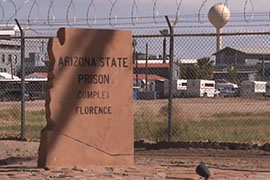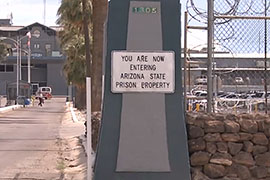Cronkite News has moved to a new home at cronkitenews.azpbs.org. Use this site to search archives from 2011 to May 2015. You can search the new site for current stories.
Court agrees inmates’ class-action suit over health care can proceed
WASHINGTON – A federal appeals court said a class-action lawsuit on behalf of all Arizona prison inmates can proceed on claims that Department of Corrections health-care policies expose inmates to “a substantial risk of serious harm.”
The ruling, posted Thursday by a three-judge panel of the 9th U.S. Circuit Court of Appeals, upheld a lower court’s certification of a class based on inmate health care, and a separate subclass for the department’s isolation cell policies.
The appellate court said inmates had supported their claims with “hundreds” of documents and statements, and that the lawsuit should continue as a class-action suit on behalf of all current or future inmates of the Arizona prison system.
“Every single ADC (Arizona Department of Corrections) inmate faces a substantial risk of serious harm if ADC policies and practices provide constitutionally deficient care,” said Judge Stephen Reinhardt in his opinion for the circuit court.
In a prepared statement Thursday, the Corrections Department said it disagrees with the ruling, but noted that the court made no judgment on the underlying charges about prisoners’ care.
“Today’s decision does not change the fact that the factual allegations made in this lawsuit are still merely allegations,” Corrections spokesman Doug Nick said in the statement.
But attorneys for the inmates welcomed the ruling in what one called the worst situation of medical care he has ever seen.
“People are literally dying who are sentenced to three years, because they don’t get to see a doctor,” said Daniel Pochada, legal director for ACLU of Arizona and one of the lawyers for the inmates.
The lawsuit was filed in March 2012 by 13 Arizona prison inmates and the Arizona Center for Disability Law. They claimed that the prison system’s medical, dental and mental health care expose inmates “to a substantial risk of serious harm, including unnecessary pain and suffering, preventable injury, amputation, disfigurement and death.”
The suit also attacked the system’s policies for holding inmates in isolation cell, saying they constitute cruel and unusual punishment. The complaint said prisoners held in isolation may remain in cells that are illuminated 24 hours a day and that inmates “often go months or years without any meaningful human interaction.”
The circuit court ruling was filled with examples of problems cited by the inmates. They ranged from examples of inmates being forced to reuse catheters because they are not given enough clean ones, prisons failing to administer a complete regimen of required medications or, in some cases, the wrong medication.
The suit cites other examples, including one time when guards stood by while a mentally ill prisoner bled to death after a suicide attempt and another when inmates had to perform CPR on a prisoner who suffered a heart attack. When they called for medical help, the guards told the inmates to “wait and see what happens,” court documents said.
The Corrections Department statement called the claims inaccurate and said it plans to fight the charges.
“The allegations are not accurate, and the Department of Corrections looks forward to vigorously challenging them and presenting our case at trial,” Nick said in the statement.
But Pochada said it is important for the inmates to have their day in court.
“It’s a very important case on behalf of a group that’s much too often underrepresented, with obviously not a whole lot of political power, and treated with great neglect by the Arizona legislature and the executive branch and the department of corrections,” he said.








